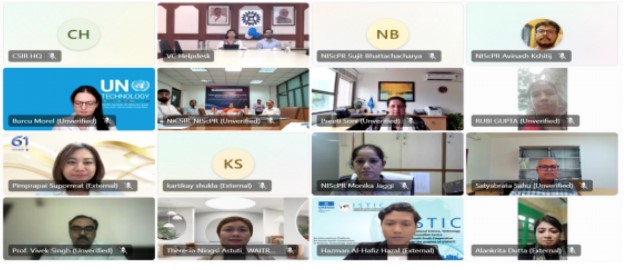Ministry of Science & Technology
CSIR, APCTT-UN ESCAP and WAITRO jointly organized Conclave on Policy Deliberations for Strengthening South-South Cooperation
प्रविष्टि तिथि:
18 SEP 2024 3:34PM by PIB Delhi
CSIR in partnership with APCTT-UN ESCAP (Asian and Pacific Centre for Transfer of Technology), and WAITRO (World Association of Industrial & Technological Research) organized a Conclave on Policy Deliberations for Strengthening South-South Cooperation on 11th September 2024 in online mode. The programme was designed and coordinated by CSIR-National Institute of Science Communication and Policy Research (CSIR-NIScPR) with CSIR-International International S&T Affairs Directorate (CSIR-ISTAD) and hosted by NIScPR.

The Conclave brought together several global institutions and eminent scholars from South countries. Head/Senior experts of major global institutions focusing on South countries: APCTT, WAITRO, ISTIC-UNESCO International Science– Framework for Ethical and Responsible Governance, West Asia North Africa Institute Jorden, UN Technology Bank for Least Developed Countries gave presentation in this conclave. Experts from various research institutions included National Research and Innovation Agency Indonesia, CSIR-NIScPR, CSIR-ISTAD, CSIR-IMD (Innovation Management Directorate), Wits Business School South Africa, National Research and Innovation Agency Indonesia, Computer Science Department-Delhi University, Indian Institute of Technology-Delhi, University of Nebraska –Lincoln USA, Institute for Studies in Industrial Development, Indian Institute of Science, Department of Science and Technology, Tshwanae Univ of Technology South Africa.
Conclave deliberated on how South countries through cooperative partnership can create Responsible governance for science and innovation for achieving Sustainable Development Goals, especially Goal 5 (Gender equality and empower all women and girls) and 17 (Partnerships for Sustainable Development Goals). The potential partnerships among South countries and possibilities that can be created were highlighted to determine how challenges can be addressed more effectively and how the south-south connect can leverage the existing efforts of individual nations. The Conclave followed by the inaugural session, had three technical sessions. Session 1 was on the topic ‘Responsible Governance for Research and Innovation’, Session 2 discussed ‘Diversity, Equity, and Inclusion in Science’, and Session 3 addressed ‘Funding Mechanisms and Capacity-Building for R&D Cooperation.’
In the inaugural session, Prof Ranjana Aggarwal, Director CSIR-NIScPR shared a broad overview of the Conclave and its significance. She stressed the need to explore new models and mechanisms that can lead to responsible research and innovation in science, Open science, access to resources, gender equity, diversity and inclusion. She highlighted that the conclave’s outcome will be presented on 19th September at the Science Summit at the 79 UN General Assembly CSIR Science Session on ‘Strengthening South-South Cooperation for Achieving SDGs’.
Dr Rama Bansal, Head CSIR-ISTAD highlighted the role of CSIR in strengthening India’s scientific and technological capacity. Dr. Preeti Soni, Head, APCTT- UN ESCAP, and Ms. Theresia Ningsi Astuti, Regional Representative for WAITRO and National Research and Innovation Agency (BRIN) in Indonesia highlighted the role played by their organizations in enhancing the scientific and technology capacity of South countries and in supporting them for achieving Sustainable Development Goals.
Session 1 was chaired by Prof. Mammo Muchie, DST-NRF SARChI Chair Rated Research Professor in Innovation Studies at Tshwane University of Technology, South Africa. This session focused on responsible governance in the context of research and innovation, emphasizing the need for an open science framework that bridges gaps between North and South countries. The session was moderated by Dr. Yatendra Kumar Satija, Senior Scientist at ISTAD-CSIR. Panellists were Prof. Ravinder Rena from Durban University of Technology, South Africa; Dr. Diran Soumonni from Wits Business School, South Africa; Prof. John Kalu Osiri from the University of Nebraska-Lincoln, USA; Prof. Vivek Singh from the University of Delhi; and Prof. ChM Dr. Mohd Basyaruddin Abdul Rahman from ISTIC-UNESCO.
The following topics were discussed: Creating enabling policies for an open science framework, Bridging the North-South divide in scientific knowledge and resources, Responsible governance practices that foster inclusion, resource sharing, and sustainability, Developing frameworks for ethically acceptable and socially desirable research in South countries.
Session 2 was chaired by Prof. Rohini Godbole from the Centre for High Energy Physics, Indian Institute of Science (IISc), Bangalore. The session was moderated by Dr. Naresh Kumar, Chief Scientist at CSIR-NIScPR. Panelists were Prof. Vivek Kumar from IIT Delhi's Center for Rural Development and Technology; Dr. Yara Shaban, Head of the WANA Office and Senior Researcher at the West Asia-North Africa (WANA) Institute in Amman, Jordan; and Prof. Ranjana Aggarwal, Director CSIR-NIScPR. The panelists drew attention to the need for developing the policies that promote diversity, equity, and inclusion in science, with emphasis on empowering women in STEM and addressing rural development. Some important examples from Indian policy and implementation in this direction were highlighted.
Session 3 was chaired by Prof. Nagesh Kumar, Director and Chief Executive of the Institute for Studies in Industrial Development (ISID) and Formerly Director at UNESCAP. Dr. Mahesh Kumar, Senior Principal Scientist at the Innovation Management Directorate (IMD), CSIR, moderated the session. The Panelists were Prof. Mammo Muchie from Tshwane University of Technology; Dr. Preeti Soni from APCTT; Dr. S. K. Varshney, Former Adviser and Head of International Cooperation at the Department of Science and Technology (DST) and Dr Rama Bansal of CSIR-ISTAD.
This session addressed the funding mechanisms and capacity-building for R&D cooperation, exploring various funding instruments and schemes that support science and technology initiatives aligned with SDGs. Examples of successful interventions and capacity building in South countries were highlighted by APCTT, CSIR, and DST.
The conclave concluded with a detailed analytical summary of key issues discussed and promising pathways that South countries have shown in meeting challenges by Dr. Sujit Bhattacharya, Chief Scientist at CSIR-NIScPR. The Conclave underscored the need for South countries to create mechanisms that can promote learning and sharing which is a collective endeavor to create Science-Technology-Innovation ecosystem in South countries for meeting developmental challenges and addressing Sustainable Development Goals.
***
PSM/AG
(रिलीज़ आईडी: 2056010)
आगंतुक पटल : 1351